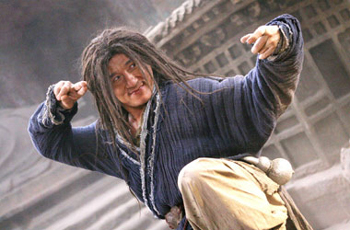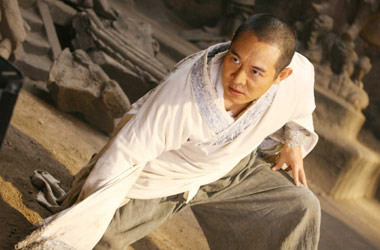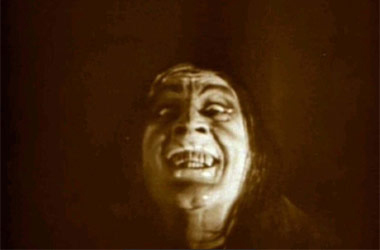Musings
an Online Journal of Sorts
By Alyce Wilson
April 15, 2008 - Grand Finale

Jackie Chan in The Forbidden Kingdom
Our final day at the 2008 Philadelphia Film Festival started a little earlier than the previous day, with our first film at 12:30 Sunday.
We still had plenty of time for breakfast at the Silk City Diner [site has music]. I ordered an egg-white omelet with crab and asparagus, served with some delicious potatoes and fresh fruit. The Gryphon ordered a breakfast burrito, and we shared an order of cheese grits. Delectable, and there was food to spare for another day.
Then it was off to the Prince Music Theater to see The
Forbidden Kingdom, starring Jackie Chan and Jet Li. The film was
directed by Rob Minkoff, a former Disney animator who directed Stuart
Little (1999) and its sequel, as well as The Haunted Mansion (2003).
We arrived early enough to relax in the lobby and read, although I discovered that I'd mistakenly brought a collection of Kurt Vonnegut stories I'd already read, so I wrote instead.
As more people arrived, we queued up in the front of the line. The festival staff were running late, and we weren't sure why until we heard the theater manager talking on his cell phone. He said that the musicians, who'd been rehearsing for a silent film that evening, had been late clearing out of the theater. The projectionist was now in the process of formatting the film.
I later heard from another volunteer that the projector didn't have the password to unlock the box where the film cans were being kept. Lionsgate was being particularly careful with this film, in order to prevent piracy before next weekend's wide release. Fortunately, they'd relaxed their standards about electronic devices, and even if we hadn't left our cell phones in the car, they wouldn't have been confiscated.
For those unfamiliar with the process of showing 32 mm film, it arrives on several smaller reels. The projectionist uses a splicer to trim the header and footer from each reel and string them together onto a giant reel, which is used to project the film. This avoids issues related to live reel changes, such as sound or focus discrepancies. Normally, when you're showing a film multiple times, you would keep it on the big reel, but when they're showing this many films, they likely don't have enough big reels to go around. Or, when you have a nervous distribution company, you have to break it back into smaller reels for safe keeping.
I also found out from the Horror Film Buff the fuller story of the musicians' troubles. Apparently, they'd been practicing from a different print of the movie than the one being shown that evening, which was the definitive Eastman print and incorporated five additional minutes. So they had been forced to rethink how to account for the difference.

Jet Li in The Forbidden Kingdom
The Forbidden Kingdom is set in mythical times and incorporates figures and elements from Chinese mythology as well as from classic martial arts films. In it, a teenage martial arts fan, Jason Tripitikas (Michael Angarano), enters a magical world. He learns the only way he can return home is by returning a special bo staff to its proper owner. In that respect, this is a hero's quest, where the protagonist navigates a colorful fantasy world full of helpful characters as well as foes who must be overcome. The script is loosely based on the Chinese epic story Journey to the West, which has also inspired many martial arts films.
In the beginning of this quest, he learns about the Monkey King (Jet Li), a character that dates back to a 16th century fantasy epic. The Monkey King has been frozen into a statue by the evil Jade Warlord (Collin Chou), and only the bo staff can release him and save the kingdom from the Jade Warlord's tyranny.
Jackie Chan plays a drunken Kung Fu master, an enduring character from Kung Fu movies, including many early Jackie Chan films. Jet Li doubles as the Silent Monk, a Shaolin Monk given to philosophical teaching and meditation.
As you might imagine, the film abounds in impressive fight scenes, often incorporating humor, although choreographed by Woo-ping Yuen (Jet Li's Fearless, Kill Bill, The Matrix Reloaded), not by Jackie Chan, who usually choreographs all his movies. Nevertheless, the action sequences combine the styles of the two martial artists fairly effectively. The only problem is that I would have liked to have seen more.
Both The Gryphon and I were familiar with Michael Angarano from previous work, namely as the younger version of main character William Miller in Almost Famous and as Elliot, the son of Jack McFarland on the TV series Will & Grace. Angarano is adept at comedy, which may be why he was cast. However, in this film, he primarily plays the straight man, only occasionally getting to do some physical humor, such as in a really entertaining training sequence. I especially enjoyed watching Jackie Chan assume the role of Drunken Master.
The Gryphon said that Angarano's role reminded him of a "Mary Sue" fanfic, where somebody, usually the writer, inserts him or herself into a famous fictional world, ultimately becoming the hero of that world and winning the respect of the famous inhabitants.
I viewed the movie, rather, as a male version of The Wizard of Oz, where a young person enters a rich inner life and learns important lessons along the way, all the while flirting with ideas of reality versus fantasy.
But in all likelihood, the true reason was to appeal to a younger audience, the families who enjoy kids' action movies. Or perhaps even to martial arts fans who wish to introduce their children to the rich history of martial arts movies in a family-friendly way.
We had made plans to meet my College Roommate for dinner, so we drove to Media after the film, which was where we were meeting her. Since we were incredibly early, we walked up to The Cedar Chest, my favorite consignment store, which sells a mix of high-quality consignment items and new boutique items. Unfortunately, the Cedar Chest was closed, as was a nearby book store, so we drove to the Granite Run Mall. While The Gryphon browsed a comic store, I tried on some dresses in JCPenney, looking for something for the formal dinner at my dad's annual medical convention. Not finding anything, we headed back to Media.
My College Roommate, unbeknownst to me, had left a message on my cell phone that she'd be walking around on State Street. My phone was still on vibrate from seeing a movie, but when I remembered to check it, I got the message and we went looking for her.
We chose to eat at Brodeur's, which is housed in a former municipal building. Under previous owners, it was the New Orleans Cafe, and the food was a little more exciting, although it's pretty good now. We arrived in time for their Twilight Dining menu, which offers special deals from 4:30 and 6. I ordered the Chicken Marsala, which was very tender, served with vegetables and mashed potatoes. The waiter was also trying hard to please us, it seemed. We had coffee afterwards and talked a bit before we all headed out and hugged good-bye.
Since The Gryphon and I had a little time, we drove back home for a little while before heading out for our final movie, the silent version of Dr. Jekyll and Mr. Hyde at the Prince. Much to our delight, we saw a number of people we knew, including The Horror Film Buff and his wife, The Seamstress; The Browncoat; another face we recognized from The Browncoat's surprise party; and a woman from The Gryphon's gaming group, with whom I had a very good time talking.
Seated in the front row of the back section, we leaned into the aisle to call out to each other until the movie started. The Browncoat said it reminded her of the opening of Laugh-In, where all the performers open windows in the "joke wall" and call out jokes.

John Barrymore in Dr. Jekyll and Mr. Hyde
I had seen short clips of the 1920 silent Dr. Jekyll and Mr. Hyde before but had never seen the entire film. Philadelphia native John Barrymore, near the beginning of his extensive film career, gives an amazing performance, considering the limitations of silent film. Initially, through facial contortions and body language alone, he transforms from the upright, beloved Dr. Jekyll to the hideously depraved Mr. Hyde. As the movie progresses, more and more makeup is used to symbolize the growing darkness as his alter ego.
At the same time, Dr. Jekyll himself subtly transforms, changing from a healthy, impeccably neat young doctor to a wild-eyed paranoid, trying to hide the evidence of his other self. In many ways, this film draws parallels to drug addiction, with Mr. Hyde frequenting London's underworld, including an opium den (though he's never seen to smoke on-screen).
This adaptation includes more characters than necessary and is heavily weighted with upfront exposition. In fact, the pace is so slow initially that I found myself cracking jokes in The Gryphon's ear. This impulse lessened as the movie progressed and the plot moved in more interesting directions.
To modern audiences, Hyde's initial crimes may not seem so shocking: drinking and meeting with loose women. Of course, at the same time, Jekyll is courting a very proper young girl, Milicent Carew (Martha Mansfield), so even a modern audience can appreciate the inappropriateness of his behavior.
In fact, when this film first screened in 1920, contemporary audiences must have found it shocking and even repellent. Such on-screen liberties taken of the silent era later led to the 1930 Hays Code, a set of industry censorship guidelines abandoned in 1968 in favor of the MPAA film rating system. If this film had been made in 1930, it would have been considerably less raw, needing to eliminate, for example, depictions of "suggestive dances," depictions of illegal drug use, hints at venereal disease and prostitution, depiction of a brutal killing, and a depiction of cruelty to children. Really, there are only a few Hays Code restrictions the film doesn't violate.
So while it might not offend a modern audience, the film did nearly everything it could to show Mr. Hyde as a hopelessly damned soul. Therefore, Jekyll's self-sacrifice at the end, when he can no longer control the monster, becomes a necessary atonement. This sentiment is explicitly stated by Jekyll's colleague, Dr. Richard Lanyon (Charles Lane), who witnesses his final moments.
This particular performance featured music by Philadelphia rock band Golden Ball [site has music]. While their music was interesting, it didn't always achieve the goals of a movie soundtrack.
First of all, I'm not sure the band had much familiarity with the music of silent films. Unlike a modern soundtrack, which might feature thematic music that doesn't draw attention to itself, live music served as the only sound accompanying a silent movie. The score could be used for everything from sound effects to emotional subtext. While some silent-film musicians created musical sound effects for everything from horses galloping to someone pouring a drink, others stuck primarily to a musical score. Charlie Chaplin, for example, often wrote music for his films. His scores added emphasis and thematic unity to the on-screen action.
With such a wealth of instruments on-stage — a drummer, several percussionists, guitarist, a bassist, keyboards — I expected creative use of instrumentation. Yet, instead of using the different sounds to maximum effect, they primarily played vamped passages that loosely fit the scenes. Movies include shadings of emotional intensity. A scene might progress from being a little eerie to really, really scary. Yet, this band played at one level of intensity throughout most scenes. Two minutes of vamped "happy music" can be irritating, ultimately detracting from the movie.
Now, some of our friends are familiar with and like the band, so I want to clarify that this is not a critique of their music, as such. In fact, near the end of the film, they combined haunting keyboard noises with a minor key urgency that provided the perfect underscore for the dramatic ending scenes. I wish they had found that same formula for the rest of the film.
As we were leaving, I ran into somebody from my grad school days, who played lead guitar in The Poet's band, Vineyard Pilgrim. I'm not sure he recognized me at first: I've lost a lot of weight since then. Since he's a musician, and since he was hanging out in the lobby after nearly all audience members had left, I asked him if he had a connection to the band. He said, while he wasn't in the band, he'd played with them in the past. He's started a record label, Honeymoon Music, which will be putting out their album. Small world!
I got so distracted talking to him that I didn't realize until we were a block away that I'd left behind my scarf, which had been a hand-knitted Christmas present. Fortunately, someone from the theater let us in to lock, and I found it right where we'd been sitting. As I explained to the usher, the person who knitted it could have knitted me another, but I'd hate to tell her, "Hey, just make me another one. I lost it in a theater and didn't go back to look." Only Mr. Hyde would do that.
More from
the 2008 Philadelphia Film Festival:
April 7, 2008 - The Art of Life
Moral:
A movie is a journey.
Copyright
2008 by Alyce Wilson
What
do you think? Share your thoughts
at Alyce's message board (left button):
![]()
![]()

